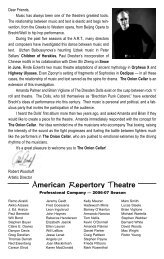Porgy and Bess Program [pdf] - American Repertory Theater
Porgy and Bess Program [pdf] - American Repertory Theater
Porgy and Bess Program [pdf] - American Repertory Theater
Create successful ePaper yourself
Turn your PDF publications into a flip-book with our unique Google optimized e-Paper software.
A Note from Suzan-Lori Parks<br />
When Diane Paulus called me on the phone <strong>and</strong> said, “I’m thinking about doing a<br />
revival of <strong>Porgy</strong> <strong>and</strong> <strong>Bess</strong>, do you want to help revive the book?” My first question was,<br />
how many other writers are you talking to? She said, “Just you.” And I said, “I’m in.”<br />
Was I familiar with the book of <strong>Porgy</strong> <strong>and</strong> <strong>Bess</strong>? Not at all. But I felt a gut thing: I was<br />
literally called on the phone, <strong>and</strong> I felt that I’d also been “called” in a spiritual sense. This<br />
project feels right up my alley; an organic next-step in the kind of writing I’ve been doing<br />
for years. Whether riffing on The Scarlet Letter, or “dancing” with Abraham Lincoln<br />
throughout my plays, or entering the world of <strong>Porgy</strong> <strong>and</strong> <strong>Bess</strong> to help give it a new life—<br />
throughout my work, shaped by the aesthetic of “repetition <strong>and</strong> revision,” I’m continually<br />
called (<strong>and</strong> re-called) to create an underst<strong>and</strong>ing between the past <strong>and</strong> the present.<br />
<strong>Porgy</strong> <strong>and</strong> <strong>Bess</strong> was written by white authors attempting to replicate an “authentic”<br />
black voice <strong>and</strong>, while the original opera triumphs on so many levels, I feel the writing<br />
sometimes suffers from what I call “a shortcoming of underst<strong>and</strong>ing.” There are times in all<br />
of our lives when, regardless of who we are, we experience shortcomings of underst<strong>and</strong>ing.<br />
In DuBose <strong>and</strong> Dorothy Heyward <strong>and</strong> the Gershwins’ original, there’s a lot of love <strong>and</strong> a lot<br />
of effort made to underst<strong>and</strong> the people of Catfish Row. In turn, I’ve got love <strong>and</strong> respect<br />
for their work, but in some ways I feel it falls short in the creation of fully realized<br />
characters. Now, one could see their depiction of African-<strong>American</strong> culture as racist, or one<br />
could see it as I see it: as a problem of dramaturgy. It’s very important <strong>and</strong> very liberating<br />
to my writing process that I continually make that distinction <strong>and</strong> that I allowed myself to<br />
see <strong>Porgy</strong> <strong>and</strong> <strong>Bess</strong> as a piece of writing that, while not morally flawed, very much needed<br />
to be fleshed out.<br />
When I wrote Topdog/Underdog, <strong>and</strong> we premiered it downtown, the rapper Mos Def,<br />
before he was cast in the Broadway version, attended the off-Broadway production<br />
countless times. Once he ran backstage wanting to meet “the guy who wrote the play.”<br />
Ah! He hadn’t read the program! He thought some dude wrote Topdog—he was having a<br />
shortcoming of underst<strong>and</strong>ing. As a writer, you’re constantly extending yourself; <strong>and</strong> if,<br />
like DuBose <strong>and</strong> Dorothy Heyward, like George <strong>and</strong> Ira Gershwin, <strong>and</strong> like myself now<br />
with <strong>Porgy</strong> <strong>and</strong> <strong>Bess</strong>, if you’re a writer going into new <strong>and</strong> important territory, you’ve got<br />
to be much more than badass. You’ve got to be bold.<br />
Diedre Murray, Diane Paulus <strong>and</strong> Suzan-Lori Parks<br />
20 AMERICAN REPERTORY THEATER


![Porgy and Bess Program [pdf] - American Repertory Theater](https://img.yumpu.com/24481101/20/500x640/porgy-and-bess-program-pdf-american-repertory-theater.jpg)
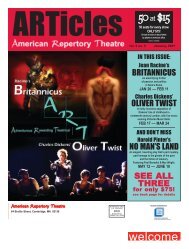
![Wild Swans Program [pdf] - American Repertory Theater](https://img.yumpu.com/49339866/1/167x260/wild-swans-program-pdf-american-repertory-theater.jpg?quality=85)
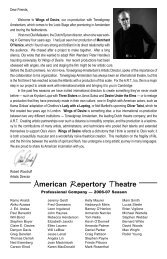
![Press Release: Trojan Barbie [pdf] - American Repertory Theater](https://img.yumpu.com/47571290/1/190x245/press-release-trojan-barbie-pdf-american-repertory-theater.jpg?quality=85)
![Articles issue as 4_2 [pdf] - American Repertory Theater](https://img.yumpu.com/45053160/1/190x249/articles-issue-as-4-2-pdf-american-repertory-theater.jpg?quality=85)
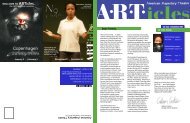
![Three Pianos Program [pdf] - American Repertory Theater](https://img.yumpu.com/41616353/1/167x260/three-pianos-program-pdf-american-repertory-theater.jpg?quality=85)
![Three Sisters [pdf] - American Repertory Theater](https://img.yumpu.com/40969361/1/190x245/three-sisters-pdf-american-repertory-theater.jpg?quality=85)

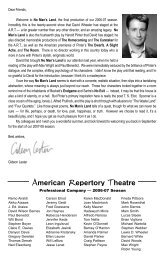
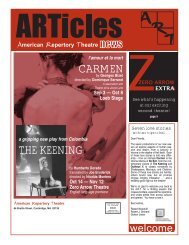
![Program: Sleep No More [pdf] - American Repertory Theater](https://img.yumpu.com/24629394/1/167x260/program-sleep-no-more-pdf-american-repertory-theater.jpg?quality=85)
![Program: Carmen [pdf] - American Repertory Theater](https://img.yumpu.com/24481072/1/190x245/program-carmen-pdf-american-repertory-theater.jpg?quality=85)
